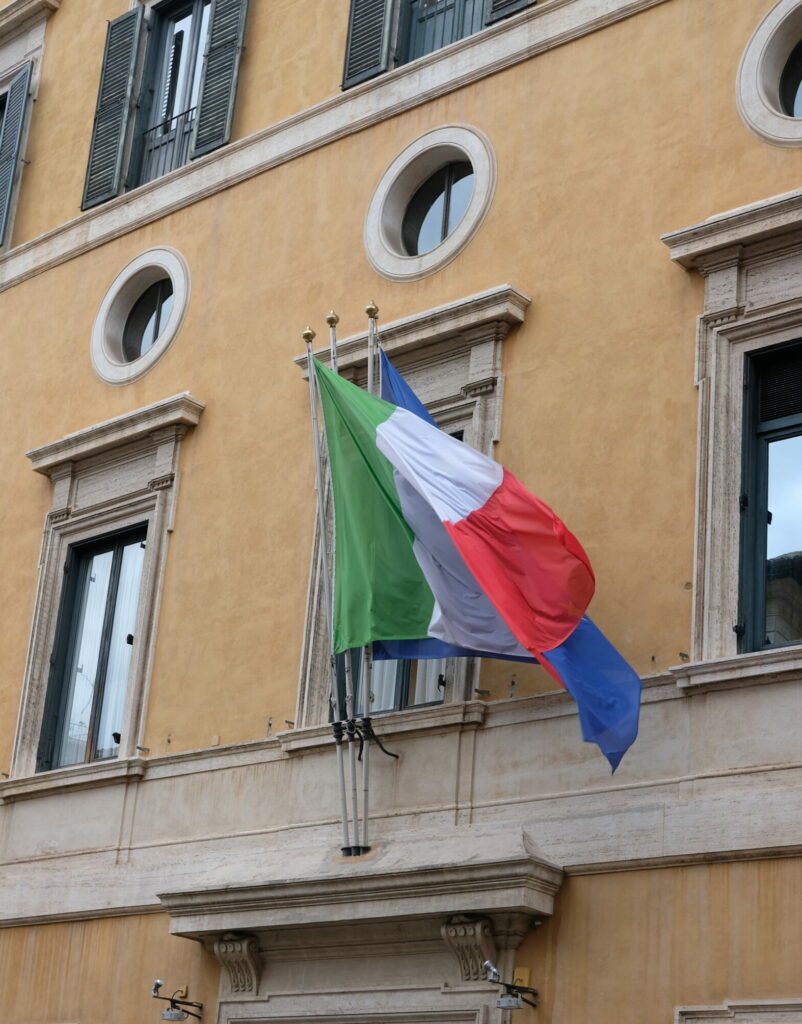
COUNCIL OF EUROPEAN JEWISH LEADERS MEET IN ROME AMID ANTISEMITISM CRISIS
EUROPEAN GOVERNMENTS ARE NOT STANDING BEHIND THEIR COMMITMENTS TO JEWISH COMMUNITIES SAY COUNCIL HEADS
“The test is now” says EJA Chairman Rabbi Menachem Margolin “and European governments are failing it so far.”
(Rome, 27 February 2024) The European Jewish Association’s Council of Jewish Leaders is meeting in Rome to discuss the challenges faced by European Jewish Communities.
Despite commitments to safeguard jewish communities and promises to root out antisemtism, too many governments across Europe have done neither, concluded the 40 Jewish heads from across Europe present at the EJA’s Council of Jewish Leaders meeting.
There is a political and policing failure to act upon anti-hate and anti-BDS legislation already in place, and despite many countries signing up to the IHRA definition, barely any are adhering to its principles.
“The laws and definition are not worth the paper they are printed on right now”, said one Dutch Jewish Community Leader, citing the number of protests advocating genocide and ethnic cleaning of Jews in Israel, and often worldwide by using Nazi tropes and iconography.
Based in Brussels and representing hundreds of Jewish communities across Europe, the European Jewish Association’s Council meeting is a key decision making body of the EJA, bringing Jewish Leaders together, to exchange insights and develop the strategic and advocacy backbone of EJA activities and policy for the betterment of Jewish life in Europe in 2024.
The Jewish leaders agreed upon an 18 point plan of action for 2024, including increasing Community safety, securing a ban on the sale of Nazi memorabilia and engaging major sports clubs and institutions in fighting antisemitism.
The Council was adressed by Israel’s Special Envoy for Combatting antisemitism, Israel’s Ambassador to Italy, Alon Bar, Italy’s special envoy for combatting antisemitism Pasquale Angelosanto, and the President of the Italian Senate, Ignazio La Russa.
Joel Mergui, the President of the EJA’s Council of European Jewish Leaders and the Paris Consistoire, said at the close of the Conference.
“The Jewish leaders are clear, we refuse to live in fear, we are strong and we will overcome this current tide of hate. It is unnacceptable that calls for genocide and ethnic cleansing as typified by “From the river to the Sea”, and calls for “infidada” are now commonplace, along with nazi symbols and outright antisemitic imagery in regular use.
This is a major cause of antisemitism, and authorities across the continent must do more to stick to their commitments that they have repeatedly given to protect Jews and fight antisemitism.”
The Chairman of the European Jewish Association, Rabbi Menachem Margolin, said.
“As Jewish leaders, it is our duty to protect our communities. The message from community leaders on the Council is clear: the EU and governments must translate their nice words on ensuring the safety of Jewish communities into meaningful actions.
“The test of any government commitments in standing up for European jewry is right now. Our council is clear, based on the evidence so far, european governments are failing this test. ”
Ends.
Gallery: https://ejassociation.eu/eja/the-council-of-jewish-leaders-in-rome/

MEP Manu Pineda, chair for relations with Palestine, shares Instagram post of Hitler poster with never again written on it being torn to reveal Israeli Prime Minister Benjamin Netanyahu giving Nazi salute under the headline ‘again’, a clear breach of the IHRA definition of antisemitism, of which the EU Institutions are a signatory.
(Brussels 3 January 2024) The Chairman of the European Jewish Association, Rabbi Menachem Margolin today wrote to European Parliament President Roberta Metsola calling for, at a minimum, the suspension from the European Parliament of the Chair for relations with Palestine, Spanish MEP Manu Pineda.
Mr Pineda shared an Instagram story video showing a poster of Adolf Hitler giving a Nazi salute under a banner that reads ‘never again’. A hooded man then rips off part the poster to reveal Israeli Prime Minister Netanyahu whose face and Israeli flag replace Hitler’s and the swastika, and leaving the word ‘again’ visible.
In his letter to President Metsola calling for the suspension from the House, Rabbi Margolin wrote,
“Regretfully, only 3 days into this new year, I must write to you concerning a blatant act of antisemitism committed by a Member of your house. I understand that in a war, feelings can run high. But this can never be an excuse to allow carte blanche to any hate speech, antisemitism included.
“In November 2022, I had the privilege of handing over our King David Award to you in Krakow, the next day we toured Auschwitz together. You are a leader who understands what is at stake, and the dark path that antisemitism can lead us to. I remember your inspiring words well. You said we should honour the legacy of the victims of the Shoah “by never forgetting, by never being indifferent, and by always, always speaking up”.
“Madame President, it is time to speak up. People look up to their public representatives, Mr Pineda included. The public often follow their lead.
“There is no doubt, none, that this video that he chose to share is antisemitic and breaches the IHRA definition of which the EU is a signatory. No words can be parsed here. The question is what will be done?
“In such a febrile time, with rates of antisemitism in Europe at levels unseen since WW2, doing nothing is not an option and only emboldens others to do the same.
“Mr Pineda has shown, in public, his antisemitism. You must show him that antisemitism is not welcome in the European Parliament. A suspension from the house would be the minimum we would expect.” Ends.

Budapest un modello di tolleranza? Ai tempi dell’invasione russa tutto è possibile (Di martedì 21 giugno 2022) Zsolt Semjén, vicepremier ungherese, ne è sicuro. Il suo è uno dei Paesi più tolleranti dell’Unione Europea. Un apparente paradosso per una «democrazia illiberale», come lo stesso premier ungherese Viktor Orban ha definito il suo progetto politico e come viene ormai additata la «sua» Ungheria. E tuttavia quest’affermazione si spiega con alcune considerazioni. «Nel mio partito ci concentriamo con una piattaforma sulla protezione dei valori biblici, e delle civiltà cristiana ed ebraica» spiega il braccio destro del leader ai microfoni di Panorama. «Gli ebrei sono da noi supportati tanto quanto i cattolici, non c’è nessun doppio stantard. Non ci piace come fanno altri Paesi europei, che lodano Israele e poi finanziano le ong anti-israeliane. L’Ungheria ha tolleranza zero vero l’antisemitismo. Semmai è l’Islam politico ad alimentare tensioni, ma nel nostro Paese …
https://www.zazoom.it/2022-06-21/budapest-un-modello-di-tolleranza-ai-tempi-dellinvasione-russa-tutto-e-possibile/11109350/
It’s a challenging time for Jewish communities in Europe. Anti-Semitism is on the rise as populism and the politics of the lowest common denominator are gaining traction. Our communities often need round the clock protection and our practices and customs such as keeping Kosher are under pressure from increasing political interference.
| Cookie | Duration | Description |
|---|---|---|
| cookielawinfo-checkbox-analytics | 11 months | This cookie is set by GDPR Cookie Consent plugin. The cookie is used to store the user consent for the cookies in the category "Analytics". |
| cookielawinfo-checkbox-functional | 11 months | The cookie is set by GDPR cookie consent to record the user consent for the cookies in the category "Functional". |
| cookielawinfo-checkbox-necessary | 11 months | This cookie is set by GDPR Cookie Consent plugin. The cookies is used to store the user consent for the cookies in the category "Necessary". |
| cookielawinfo-checkbox-others | 11 months | This cookie is set by GDPR Cookie Consent plugin. The cookie is used to store the user consent for the cookies in the category "Other. |
| cookielawinfo-checkbox-performance | 11 months | This cookie is set by GDPR Cookie Consent plugin. The cookie is used to store the user consent for the cookies in the category "Performance". |
| viewed_cookie_policy | 11 months | The cookie is set by the GDPR Cookie Consent plugin and is used to store whether or not user has consented to the use of cookies. It does not store any personal data. |